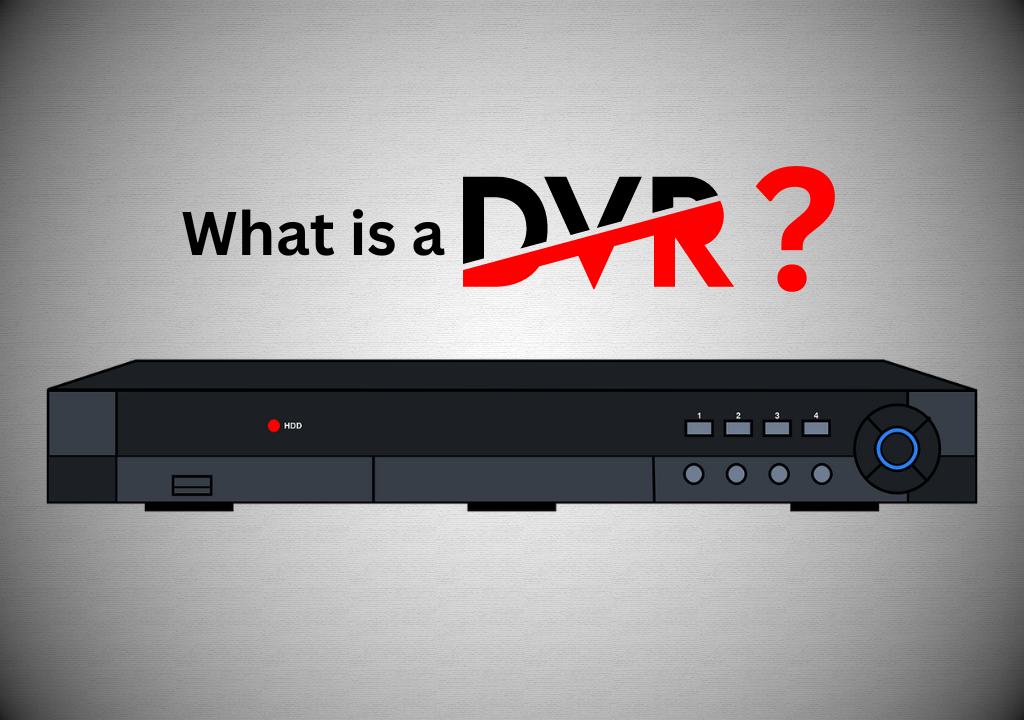Digital Video Recorder (DVR) are an essential component of modern surveillance systems, offering a reliable and cost-effective solution for recording and storing video footage. In this comprehensive guide, we will explore the features, advantages, and disadvantages of DVRs, as well as alternatives to consider. Whether you are a small business owner or a homeowner looking to enhance your security, this article will provide you with valuable insights to make an informed decision.

What is a Digital Video Recorder (DVR)?
A Digital Video Recorder (DVR) is a device that converts analog video signals from cameras into a digital format, allowing for easy storage and playback of recorded video footage. Unlike traditional analog recording systems, DVRs offer enhanced functionalities and improved video quality. DVRs are commonly used in various settings, such as retail stores, offices, warehouses, and residential buildings, to monitor activities, ensure safety, and protect assets.
How Do DVR Security Systems Work?
Digital Video Recorder security [DVR] systems connect to analog cameras via coaxial cables and utilize internal hard drives and encoding software to process and store video footage locally. These systems operate on a closed circuit and are not connected to a network like modern surveillance systems. Let’s explore the main features of DVR security systems to gain a better understanding of how they work:
Connects Directly to Cameras
DVR systems are hardwired, requiring individual connections to each camera using coaxial cables. This direct connection ensures a stable and reliable transmission of video signals from the cameras to the DVR.
Captures Analog Pictures
Digital video recorders are designed to work with analog cameras, converting the analog video signals into a digital format for storage and playback. However, it is possible to upgrade and replace analog cameras with higher quality versions when needed.
Processes Video Data at the Recorder
DVR systems utilize an encoder to process and compress the video data captured by the cameras. This encoding process ensures efficient storage of video footage on the internal hard drive of the DVR.
Stores Footage on a Hard Drive
One of the key features of DVR systems is their ability to store recorded video footage on a local hard drive. This local storage option provides immediate access to the footage and eliminates the need for an internet connection to retrieve the data.

Pros and Cons of DVR Security Systems.
Like any technology, DVR security systems have their own advantages and disadvantages. Understanding these pros and cons will help you determine if a DVR system is the right choice for your security needs:
Benefits of DVR Camera Systems.
Cost-Effective Set Up
DVR camera systems are an affordable option for small businesses and homeowners. They integrate well with lower quality analog cameras, resulting in cost savings compared to more advanced surveillance systems.Secure Connections
As DVR systems do not require an internet connection to operate, they can be set up in remote locations where network connectivity might be limited. This lack of network connectivity also eliminates the risk of hacking, providing a secure surveillance solution.Instant Access
With DVR systems, video footage is stored on the local hard drive, allowing for instant access and playback. Surveillance staff can quickly review recorded footage as soon as it is captured, enabling prompt action if any incidents occur.Special Features
Although DVRs may not have the advanced features of other surveillance systems, they can still be configured with additional functionalities such as motion detection and time stamping. These features make it easier for surveillance staff to locate specific incidents in the recorded footage.
Challenges of DVR Camera Systems.
Limited Flexibility
DVR systems require proximity to a power source, which can limit the installation options for businesses. Additionally, the need for physical access to the storage device makes reviewing footage more inconvenient, as it must be done at the location where the DVR is installed.Maintenance Fees
In the event of a malfunction, DVR systems often require hardware repairs or replacements, which can be costly. Unlike software-based issues, hardware failures can be more challenging and expensive to resolve.Clunky Wiring
Unlike more modern surveillance systems that can utilize wireless configurations, DVR camera systems rely on coaxial cable connections. These cables can be challenging to install in tight spaces, and they do not support audio. As a result, additional wiring is often required to ensure proper camera operation.Low Image Quality
Compared to higher resolution cloud-based and hybrid cloud cameras, DVR camera systems output lower quality video footage. Business owners and surveillance teams need to consider whether the cost savings of DVR systems outweigh the potential loss in picture clarity.Storage Capacity
DVR camera systems rely solely on local storage, which limits their storage capacity compared to systems that can utilize cloud storage. Without internet connectivity, DVRs cannot take advantage of ethernet or WIFI connections to expand their storage capabilities.

DVR vs. NVR: Choosing the Right Solution
While DVRs have been a popular choice for surveillance systems in the past, Network Video Recorders (NVRs) have emerged as a more versatile and scalable alternative. NVRs offer several advantages over DVRs, including the ability to connect to IP cameras, higher video resolutions, and the flexibility to upgrade storage capacity. If you are considering a surveillance system, it is essential to evaluate your specific requirements and consider the following factors:
Camera Compatibility:
DVRs are designed for analog cameras, while NVRs are compatible with IP cameras. If you have existing analog cameras, a DVR may be a suitable option. However, if you require higher resolution or plan to upgrade to IP cameras in the future, an NVR is the better choice.
Scalability:
DVRs have a fixed number of input channels, making them less flexible when it comes to expanding your surveillance system. NVRs, on the other hand, can be easily scaled by adding additional IP cameras or increasing storage capacity.
Video Quality:
NVRs support higher video resolutions, providing sharper and more detailed footage compared to DVRs. If image quality is a priority, an NVR system will deliver superior results.
Storage Options:
DVRs rely on local storage, while NVRs offer the flexibility of storing video footage locally or in the cloud. Cloud-based storage provides additional security and off-site backup capabilities.
Installation and Maintenance:
DVRs are generally easier to install and maintain, as they do not require network configuration or additional software. NVRs, while more complex to set up, offer advanced features and remote access capabilities.
By carefully considering these factors, you can make an informed decision about whether a DVR or NVR system is the right fit for your surveillance need. Read more in Detail About DVR and NVR
Alternatives to DVR Security Systems
While DVRs and NVRs have their own strengths and limitations, there are alternative solutions available for video surveillance. Hybrid camera software and hardware, such as those offered by Verkada, combine the benefits of both DVR and NVR systems. These hybrid solutions provide advanced features, scalability, and remote access capabilities while maintaining a user-friendly interface.

Conclusion
Digital Video Recorders (DVRs) have been a staple in surveillance systems for many years, offering an affordable and reliable solution for small businesses and homeowners. However, with advancements in technology and the availability of more versatile options like Network Video Recorders (NVRs) and hybrid solutions, it is crucial to evaluate your specific needs and consider the advantages and disadvantages of each system. By understanding the features, benefits, and limitations of DVRs, you can make an informed decision to enhance your security and protect your assets effectively.


